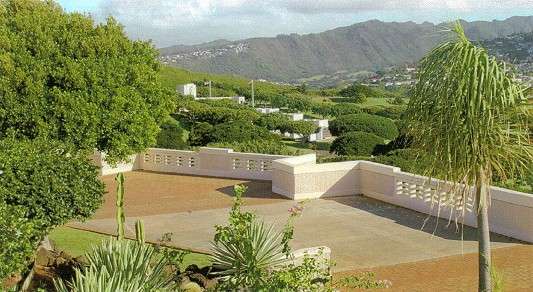 |
National Memorial Cemetery
of the Pacific
November 2002
|

| The National Memorial
Cemetery of the Pacific and the Honolulu Memorial, covering 116 acres,
are located in Puowaina Crater, an extinct volcano referred to in Hawaii
as "Punchbowl" because of its shape. Roughly translated, "Puowaina"
means "Consecrated Hill" or "Hill of Sacrifice." The Punchbowl was the
site of many secret "alii" (royal) burials. It was also the place where
offenders of certain "kapus" (taboos) were sacrificed. |
| By the end of World War
II, several hundred temporary cemeteries had been established by the
American Graves Registration Service of the U.S. Army. Puowaina Crater
was selected as a permanent cemetery site when major objections were
made to the temporary cemeteries in the central and south Pacific areas.
Construction began in August 1948 and the first remains were interred on
January 4, 1949. Seven hundred seventy-six (776) casualties from the
December 7, 1941, attack were among the first to be interred here. The
cemetery was opened to burials on July 19, 1949, the date on which Ernie
Pyle was interred; and it was dedicated on September 2, 1949, the fourth
anniversary of V-J Day. |
| This cemetery is one of
two hallowed resting places in the vast Pacific for the recovered
remains of World War II dead whose next of kin did not request return of
the remains to the continental United States or requested that they be
buried here. Original burials included 11,597 identified and 2,079
unidentified World War II dead from the Pacific. They came from such
battle sites as Guadacanal, China, Burma, Saipan, Guam, Okinawa and Iwo
Jima and from prisoner of war camps in Japan. One hundred seventy-eight
(178) Wake Island dead were interred in a mass burial on July 10, 1953.
Also interred in the cemetery are the unidentified remains of 848 U.S.
servicemen who died fighting in Korea. The other hallowed resting place
in the Pacific for the World War II dead is the Manila American Cemetery
and Memorial, Fort Bonifacio, Manila, Republic of the Philippines, which
is administered by the American Battle Monuments Commission. |
| Punchbowl is now filled to
capacity with 33,255 gravesites. Since August 1, 1991, burials have been
at the Hawaii State Veterans Cemetery in Kaneohe. This cemetery also has
available urn niches in the Columbarium for cremated remains. |
| The Honolulu Memorial was
erected by the American Battle Monuments Commission in 1964 and was
dedicated on May 1, 1966. It was erected to honor the sacrifices and
achievements of American Armed Forces in the Pacific during World War II
and the Korean Conflict. In 1980, it was enlarged to include the missing
of the Vietnam Conflict. |
| This impressive memorial
sits high on the wall of Puowaina Crater overlooking the graves area of
the cemetery. It consists of a non-sectarian chapel, two map galleries,
a monumental staircase leading from the crater floor to the Court of
Honor, ten Courts of the Missing and a Dedicatory Stone centered at the
base of the stairway on which is inscribed, 'IN THESE GARDENS ARE
RECORDED THE NAMES OF AMERICANS WHO GAVE THEIR LIVES IN SERVICE TO THEIR
COUNTRY AND WHOSE EARTHLY RESTING PLACE IS KNOWN ONLY TO GOD." |
| In the ten Courts of the
Missing which flank the monumental staircase are recorded the names of
18,094 World War II heroes missing in action (MIA) or lost or buried at
sea in the Pacific (excluding the Southwest Pacific and the Palau
Islands - the MIA's from these areas are memorialized at the Manila
American Cemetery), 8,195 in the Korean Conflict, and 2,489 in the
Vietnam Conflict, a total of 28,778 names. |
| On the front of the tower
which houses the chapel is a 30-foot female figure, known as "Columbia",
standing on the symbolized prow of a U.S. Navy carrier with a laurel
branch in her left hand. Engraved below the figure is the poignant
sympathy expressed by President Abraham Lincoln to Mrs. Bixby, mother of
five sons who died in battle, "...THE SOLEMN PRIDE THAT MUST BE YOURS TO
HAVE LAID SO COSTLY A SACRIFICE UPON THE ALTAR OF FREEDOM." |
| The map galleries extend
fromt he right and left sides of the tower and they contain mps and
texts recording the achievements of the American Armed Forces in the
central and south Pacific regions and in Korea. |
This information was prepared by
the 100th Infantry Battalion Veterans Club, whose members man the information
center as a community service. If you need more information regarding the
cemetery, please call (808) 532-3720, weekdays, between the hours of 8:00 a.m.
and 4:30 p.m.)
Copyright © 2002-2018 Lorraine Marks-Haislip
|

